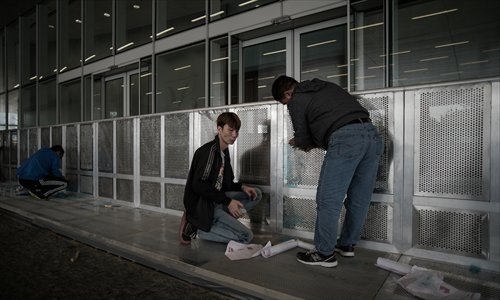HK starts 2nd consultation on 2017 chief leader election
Failure to pass reform plan could leave HK in political chaos: expert

Workers set up a fence in front of the entrance of the Legislative Council building in Hong Kong on Wednesday as the government takes the next step in its political reform process by unveiling new proposals for how the city should choose its next leader. Photo: AFP
Hong Kong's government on Wednesday launched a second round of consultation on how the region should elect its chief executive in 2017. The current round will run for two months, with analysts saying the plan is vital for the future of Hong Kong.
The Hong Kong government is inviting public views on the Nominating Committee's formation, details of the nominating process and the public voting process.
Consultation will proceed in line with the Standing Committee of National People's Congress's (NPC) framework, which was laid out in late August last year.
According to the new plan, candidates will be nominated by a 1,200-member Nominating Committee.
The consultation has suggested lowering the requirements for candidates for nomination from 150 to 100, increasing competition by allowing more candidates to participate in the nomination.
The plan calls for a maximum of 12 candidates to be nominated.
It proposed four options on how Nominating Committee members could nominate their preferred candidate, allowing them to back multiple nominees or support each nominee individually.
Chang Chak-yan, a former political science professor at the Chinese University of Hong Kong, told the Global Times that all options are fair and will ensure the competitiveness of the nominating process.
After nomination, nominees must gain the support of at least half of the Nominating Committee members in order to become a full-fledged candidate for chief executive.
Current Chief Executive Leung Chun-ying said in a statement Wednesday that it is the common aspiration of central authorities, the Hong Kong government and the public to implement universal suffrage whereby the region's chief executive is chosen on a one person, one vote basis. He stressed that moving forward is always better than standing still.
Chief Secretary for Administration Carrie Lam Cheng Yuet-ngor said on Wednesday that the reforms will have a positive impact on the political system because the nominees for chief executive will need to be responsible for the region's residents, while their political views and their proposed policies will closely reflect the public's needs.
Tian Feilong, a legal expert at Beihang University in Beijing and visiting scholar at the University of Hong Kong, told the Global Times that the launch of the second consultation is vital for the future of Hong Kong and shows the government's transparency in the reform process.
"The consultation is part of preparing the region for universal suffrage. The final plan must be approved by two-thirds of the Legislative Council. If the city could indeed enjoy universal suffrage, it would greatly improve the relations between Hong Kong and Chinese mainland and benefit the city's development and economy," Tian said.
He noted that there is a fairly good chance that the plan could fail to acquire enough votes.
"In that case, Hong Kong will encounter a major political setback … The city could be mired in political chaos as street protesters and legislators are engaged in constant disagreement. It will be increasingly more difficult for Hong Kong to tackle its social and economic problems," Tian said.
Lam emphasized the chance to elect the chief executive by public ballot in 2017 is an opportunity not to be missed.
Occupy groups have said that they will boycott the consultation as they disagree with the framework designed by the NPC. Benny Tai Yiu-ting, one of the founders of Occupy Central, also said he will not participate in the consultation as it is meaningless.
The consultation was scheduled to begin last October but was postponed until Wednesday due to the illegal 79-day Occupy protest.
Begun in late September, 2014, Occupy protesters paralyzed streets and roads in main commercial districts, including Central, Admiralty and Mongkok. Several clashes between protesters, police and anti-Occupy protesters broke out. The protests ended on December 16 as police arrested a total of 955 people, with another 75 surrendering to authorities of their own accord.